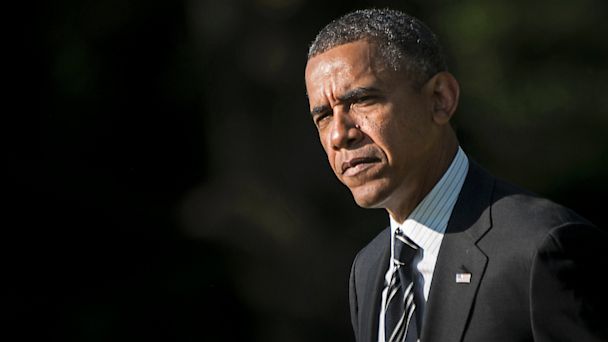President Obama's 'Red Line': What He Actually Said About Syria and Chemical Weapons

Credit: Brendan Smialowski/AFP/Getty Images
President Obama's "red line" on Syria isn't quite as straightforward as it's been made out to be.
The president is facing a complicated decision on Syria. With the White House now expressing "very little doubt" that the regime of Bashar al-Assad used chemical weapons in an attack Wednesday outside Damascus, some U.S. lawmakers are calling for a military response - or at least an update on what options are being considered.
Today, the office of House Speaker John Boehner asserted that Syria had crossed the "red line" staked out by Obama last year - the use of chemical weapons on its own people.
"The Syrian regime has blatantly crossed President Obama's red line, the White House has acknowledged, by using chemical weapons on its people," wrote Boehner communications aide Brendan Buck, calling on Obama to consult with Congress and address the American people if he pursues a response.
"[I]f he chooses to act, the president must explain his decision publicly, clearly and resolutely," Buck wrote.
The use of chemical weapons, itself, was not exactly Obama's original "red line," as he laid it out during a news conference at the White House on Aug. 20, 2012. For purposes of expediency and practicality, media outlets have simplified the "red line" as this: If Syria deployed chemical weapons against its own people, it would have crossed a threshold with the White House.
But what Obama said was a little less clear.
"We have been very clear to the Assad regime, but also to other players on the ground, that a red line for us is we start seeing a whole bunch of chemical weapons moving around or being utilized," the president said a year ago last week. "That would change my calculus. That would change my equation."
It was also unclear what the consequences of crossing that "red line" would be. Obama has cautioned that unilateral action, particularly without a U.N. mandate, may be unwise and could run afoul of international law. In keeping with the strategy he used in seeking international cooperation for airstrikes against Libya in 2011, Obama warned in a CNN interview last week that international cooperation is key to military intervention.
To many, Wednesday's attack outside Damascus would likely qualify as "a whole bunch" of chemical weapons deployed.
Over the weekend, the group Doctors Without Borders announced that three Damascus-area hospitals it supports received an influx of 3,600 patients within three hours on Wednesday morning, 355 which reportedly died, according to the group.
"[T]he reported symptoms of the patients, in addition to the epidemiological pattern of the events - characterized by the massive influx of patients in a short period of time, the origin of the patients, and the contamination of medical and first aid workers - strongly indicate mass exposure to a neurotoxic agent," Dr. Bart Janssens, the group's director of operations, announced via the Doctors Without Borders website Saturday morning.
Symptoms included "convulsions, excess saliva, pinpoint pupils, blurred vision and respiratory distress," Janssens said.
But despite the description of "mass exposure" to nerve gas, whether the "red line" has been crossed seemingly will depend on Obama's interpretation of how much gas was used and may also depend on whether Obama intended his "red line" to refer to multiple attacks and large-scale movement of weapons, not just a "whole bunch" of neurotoxins deployed at once.
For his part, the president seemed to be moving more seriously toward action.
Over the weekend, Obama's top military and intelligence advisers presented him with a range of options, the White House announced after a Saturday meeting, and he spoke via phone with U.K. Prime Minister David Cameron and French President Francois Hollande, discussing "possible responses" from the international community, the White House said.
Those two countries, Britain and France, comprised America's principal partners in conducting airstrikes against Libya in March 2011.